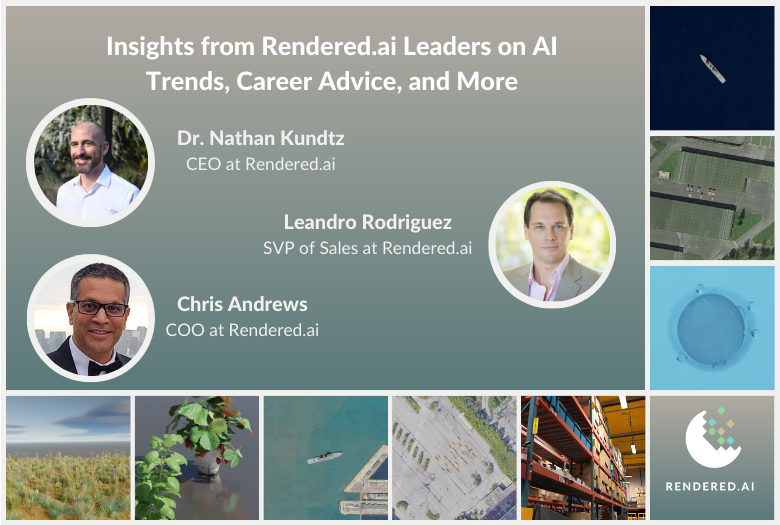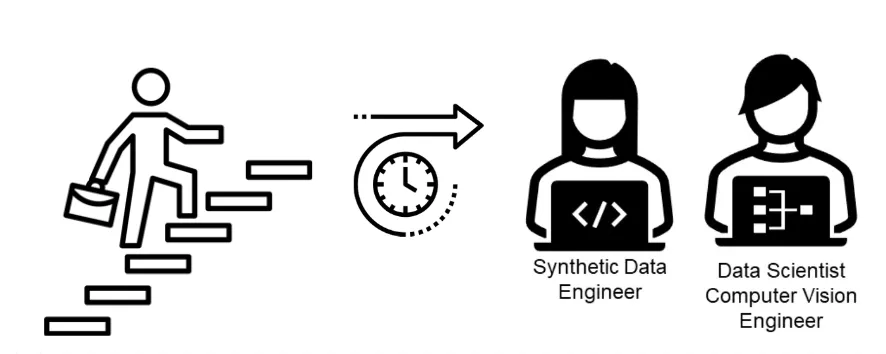Career Advice and Insights on the AI market from Rendered.ai Leaders
TL;DR: In an interview, the leaders of Rendered.ai discuss the latest trends in AI, adapting to a rapidly shifting market, and how to prepare for a career in AI. With the growing emphasis on automation, there is an increased demand for skills to adapt artificial intelligence and machine learning tools to new business and market problems. But growing your career depends on more than just technical acumen and degrees.

As the use of artificial intelligence (AI) and machine learning (ML) continues to expand, there are huge opportunities for future AI professionals. In this interview session, Dr. Nathan Kundtz, CEO of Rendered.ai, Chris Andrews, COO, and Leandro Rodriguez, SVP of Sales discuss the rapidly shifting market of artificial intelligence and how to adapt.
What are some trends that are shaping the AI market and how should professionals be adapting to or embracing them?

Professionals need to embrace and adapt to trends that are shaping the AI market.
Nathan: The most important ‘trend’ in the AI market is growing disruption and uncertainty. There is so much happening so quickly that it is hard or impossible for companies and industries to keep up. Professionals in AI need to offer more than the latest AI tech, they need to be guided to their customers and users that are living through the disruption.
Chris: Not only has the explosion of interest in ChatGPT accelerated the education of the broader market about AI, the form factor, in which anyone can experiment with ChatGPT in a browser, has suddenly put a new and deceptively simplistic tool in the hands of anyone who can type. Anyone entering the AI market today needs to examine the capabilities and possibilities of Large Language Models (LLMs) and to plan to adapt them for use in future job roles.
The other big trend that is less obvious, but possibly more daunting, is the sensorization of the world and the need to turn the exponentially increasing amount of sensor data that we are capturing into actionable insights. From new satellites to increased cameras in retail stores, unstructured content needs to be processed so that humans and machines can make decisions in sustainable patterns that can scale into the future. There are huge opportunities for future AI professionals to make all of this sensor data analysis more accurate and meaningful.
Leandro: The ability to prompt models will be crucial to adapt to the market, as only a select few will become AI experts. Instead, most of us will have to interface with models through a GUI that requires prompting the model to get the most out of it, and a basic understanding of AI/ML models will be critical to do so.

The Synthetic Data Engineers and Computer Vision Engineers of tomorrow are already learning the skills they need today.
What is the relationship of credentials or degrees with advancement in an AI career in the future?
Chris: With the rapid diversification of AI technology and adoption, it’s hard to see traditional degree or certificate programs keeping up. As AI capability is democratized, in some cases less technical adopters have some advantages over traditional highly technical developers and engineers. Possibly the most important advice is for someone not to feel self-limited because they don’t have a specific degree or credential.
Leandro: AI and its branches are a highly technical discipline based on fundamentals like advanced math, physics, statistics, and others. Whether a person absorbs those fundamentals on their own or through a structured curriculum in a university, they are necessary. Degrees, per se, are not as important as the opportunity to go through a structured curriculum, with peers and professors that challenge and support you along the way.
Nathan: I don’t think there is any one answer to this question, any more than there would be for any industry. Careers in AI will span from deep mathematics to program management to robotics and chemistry. Most AI practitioners will develop expertise in adjacent industries, and then learn how to incorporate AI tools.
What is an overlooked skill that you’ve learned that you would recommend to an early career job seeker interested in the AI market?
Leandro: If you are early in your career and want to explore AI, learn the fundamentals of statistics. Statistics are at the core of what drives ML and AI, and learning the basics is an accelerant to understanding more complex applications.
Chris: Many early career folks feel they can do their job, keep their head down, and they’ll get rewarded. This is an extension of the grading system in schools and, frankly, doesn’t work the same in the working world where goals and metrics may be more flexible and less well-defined. The power of building relationships with peers, managers, and, in some cases, direct reports, is hard to understand. Eventually, a combination of strong performance, flexibility, and those relationships ends up opening doors and presenting opportunities that would never come to you if you’re glued to your work.
Nathan: I would encourage any early career job seeker to build their active listening skills. Active listening is an important skill both internally, to communicate better with team members, and while facing customers, to understand their needs and requirements.
What is a characteristic in a job applicant that compels you to want to hire them?
Leandro: Curiosity. Curiosity is at the heart of an applicant’s ability and speed of learning. I test for it by doing two things: giving applicants a difficult concept and asking them to briefly explain in one slide, and second, listening attentively to the kind of questions they ask and the depth of the research they do before interviews.
Nathan: I look for a ‘values fit’ in three categories: Curiosity, Hard Work, and Respect. Hard Work and Respect are table stakes. Curiosity is important if you want to thrive in a quickly changing environment.
Chris: High creative roles can encourage lots of experimentation and learning. These aren’t bad things on their own, but they can become distractions if not paired with execution. I typically try to hire people who have demonstrated appropriate accomplishments for their career level and have the displayed skills and focus to know that they need to complete tasks and execute them to make meaningful progress.
Interested in learning more about AI trends and what Rendered.ai does?

Physically accurate synthetic images generated using the Rendered.ai platform. Rendered.ai is a PaaS for synthetic data generation for AI training and validation.
There are multiple paths to find out more about synthetic data and Rendered.ai. Our support documentation is open. Anyone can sign up to try out our platform. We also publish numerous blogs, interviews, and videos covering the value of synthetic data and how to use our platform.
Follow these links to find out more:
- Sign up to get started generating your synthetic data on the Rendered.ai platform
- Check out our learning path on our support site
- Here’s an overview video of the platform
- Sign up for Rendered.ai’s newsletter to stay informed!
And if you have any other questions, you can always contact us here!



